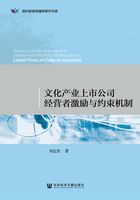
Abstract
With the deepening of the reform of the cultural system,the perfection of micro-operation system is necessary for the cultural firms to be full of vigor and with high efficiency. Then,what the effective mechanism of incentive and restraint in cultural industries should be,and what’s its situation now?These two problems constitute the main content of this dissertation. Based on Game theory and Principal-agent theory,the dissertation examines the mechanism of incentive and restraint for managers in listed firms of cultural industries.
Under the background of enterprise restructuring in cultural industries,it is significant to develop the cultural industries with understanding the present situation and setting up effective mechanism of incentive and restraint for managers. Both theoretically and empirically,the dissertation researches into the incentive and restraint mechanism according to incentive and restraint.
In the aspect of theoretical analysis,the dissertation applies normative analysis to explain what it should be about the effective mechanism of incentive and restraint in the cultural industries. In terms of the analysis of incentive mechanism,the study analyzes the reason of incentive firstly. After that,the study divides the incentive into monetary incentive and non-monetary incentive. The monetary incentive focus on three points:managers’ remuneration,equity incentive and pay differential,meanwhile,the non-monetary emphasize perquisite consumption and reputation incentive. The analysis of restraint starts with the reason that why the managers need to be restricted,and the study on restraint includes internal restraint and external restraint. The study examines the internal restraint with the supervision of shareholders,board of directors and supervisory board. On the other hand,the study investigated external restraints with the competition of production market,managerial labor market and capital market. On the basis of theoretical analysis,the study proposed 20 research hypotheses.
Empirically,the dissertation uses the data of the listed firms of communication and cultural industries during 2011-2013 to test the research hypotheses. According to the differences between the test results and the theoretical predictions,the study found the problems of the mechanism of incentive and restraint for managers in the listed firms of communication and cultural industries and proposed some suggestions. Overall,in accordance with the results,the dissertation presents four conclusions as follow:
Firstly,in the aspects of monetary incentive,the result shows that there is no correlation between managerial remuneration and corporate performance,but the managerial remuneration appears to be positively related to corporate size. The result also provides support for the managerial stock ownership can improve corporate performance,and the managerial pay differential does play a major role in influencing incentive.
Secondly,as for non-monetary incentives,managerial perquisite consumption is a substitute for managerial remuneration,but it can only provide limited incentive to manager. Furthermore,there is negative correlation between perquisite consumption and corporate performance,and the perquisite will reduce the corporate performance. Evidence shows that reputation play an important role in motivating manager to make more efficient.
Thirdly,it is shown that monitoring efficiency may be defective if totally depend on large shareholders. The relation between the size of board of directors and firm performance is negative indicating that the firm performance will be worse when the number of board of directors increase. Moreover,the outside directors do not significantly affect the firm performance. But the supervisory board is bringing obvious restraints to managers.
Fourthly,in terms of external restraint,the result indicates that higher level of product market competition increases the positive relation between managerial remuneration and firm performance. Currently,the managerial labor market,which managerial resource allocation responsive to market force,has not formed in China. Fostering managerial labor market needs the state-owned enterprises to change the system of managerial employment arrangements. The capital market has a weaken restriction on managers. Additionally,the proportion of institutional investors’ share is low,which leads to their ineffective influence on managers. Similarly,the debt market can not bring the pressure on managers either.
Overall,both the company management and imperfections of market mechanism contribute to the inefficiencies of the mechanism of incentive and restraint of cultural industries listed firms. There is still much room for improvement.
Key words: Cultural industries;Managers;Mechanism of incentive and restraint;Principal-agent;Game theory